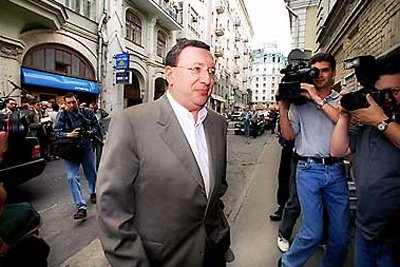Vladimir Gusinsky: The Media Mogul and Businessman

Vladimir Gusinsky, born on October 6, 1952, is a Russian-Israeli Jewish tycoon and entrepreneur renowned for founding the Media-Most conglomerate. He is known for his ownership of the independent NTV channel, the newspaper Sevodnia, the radio station Echo of Moscow, and several magazines. He also holds Spanish citizenship.
Early Life and Education
In 1969, Gusinsky was admitted to the Gubkin Institute for the Study of Oil and Gas but did not complete his studies there. In 1973, he was conscripted into the Soviet Army and served in the Chemical Intelligence Corps for two years. After his military service, he enrolled in the Russian Academy of Theater Arts, where he studied for three years and successfully graduated.
Career Beginnings
In 1986, Gusinsky managed Ted Turner's "Goodwill Games" at the Kremlin Palace. With the onset of perestroika, he co-founded one of the first cooperatives in the wake of these reforms, called "Metall," which began producing metal utensils and later copper bracelets and fashion accessories in significant quantities.
In 1988, he established the "INFEKS" cooperative under the auspices of the Soviet Ministry of Foreign Trade, which advised foreign companies entering the Russian market. A year later, he co-founded the joint venture "Media-Most" with APCO, a consulting firm owned by the law firm Arnold & Porter in Washington, D.C. In addition to this, Gusinsky founded "Bank Most," one of the first and largest private commercial banks in Russia. The first ATMs in Russia that dispensed cash were installed at Bank Most in 1994.
In 1992, he founded the holding company "Most Group," comprising all of Gusinsky's business assets, totaling 42 companies, including Bank Most and several construction companies, which were all integrated into this conglomerate.
Involvement in Media and Conflict with Authorities
In 1993, Gusinsky joined forces with several prominent journalists and founded Sevodnia, a daily political newspaper. Later that year, Gusinsky and leading TV journalists, such as Igor Malashenko, Yevgeny Kiselyov, and Oleg Dobrodeyev, established NTV, the first private television channel in Russia, through the Media-Most media company. NTV focused primarily on independent and uncensored news coverage and objective political programs, with the slogan "The News is Our Profession."
During the First Chechen War, which began in 1994, NTV provided independent and often critical coverage of the Russian government's actions, its excessive use of force against civilians, and the high civilian casualty toll.
The government and its supporters accused NTV and its founders of collaborating with anti-Russian Chechen forces, although these allegations were never substantiated.
In December 1994, President Yeltsin's secret service was ordered to raid Gusinsky's offices. Consequently, Gusinsky and his family were forced to leave Russia. Gusinsky was only able to return in May 1995, but during his absence, NTV and all his other media properties continued to report on the war independently.
In 1996, Gusinsky was one of the founders of the Russian Jewish Congress, and he also served as its president. In February of the same year, during the Davos Economic Forum, Gusinsky organized a meeting with Russia's most prominent businessmen to decide how to support Yeltsin's presidential candidacy and prevent the Communists from returning to power. The group also established contact with Anatoly Chubais, a proponent of privatization, and persuaded him to lead Yeltsin's presidential campaign.
The presidential elections in Russia took place in June 1996 (first round), with Yeltsin being re-elected in the second round in July 1996. Many international and local observers considered these elections as Russia's closest approximation to Western democratic standards.
In 1996, Gazprom, the state-owned natural gas giant, acquired a 30% stake in NTV through its media subsidiary Gazprom-Media. Capital Group, a U.S.-based media investment firm, also purchased 5% of NTV shares and 5% of TNT shares, a regional network. In 1997, "Most Group" consolidated most of its media assets into a new entity called "Media Most."
Gusinsky stepped down from his positions in "Most Group" and "Bank Most" to become the president of "Media Most," where he focused on developing media businesses. "Media Most" included NTV, TNT, NTV PLUS, Echo of Moscow, the publisher of "7 Dnei" magazine, additional radio stations, internet development companies, film studios, and media design companies.
"Media Most" became Russia's largest media conglomerate in terms of viewers and readers and was likely the largest in Europe. Gusinsky received acclaim and was regarded as Russia's equivalent of Rupert Murdoch. Although Gusinsky had never previously ventured into politics, in 1997 he attempted to participate in the privatization of Svyazinvest, Russia's telecommunications giant.
His proposal was unsuccessful, and he faced widespread accusations of using his media assets to influence the privatization process, resulting in significant public controversy.
In November 1998, "Media Most's" satellite, Bonum 1, manufactured by the U.S. space and communications company Hughes, was launched from Cape Canaveral, Florida, marking the first private commercial satellite in Russia and the first satellite controlled from Russian territory. Bonum 1 provided direct broadcasts to households for NTV PLUS.
During this period, a coalition that included President Yeltsin, his close associates (known as "The Family"), and a group of businessmen, publicly called "The Family," was instrumental in bringing Vladimir Putin to power as Yeltsin's successor. Simultaneously, Gusinsky distanced himself from "The Family," leading to accusations of supporting a group against the Kremlin led by Primakov and Luzhkov. This marked the beginning of the conflict between Gusinsky, "The Family," and Putin.
- ולדימיר גוסינסקיhe.wikipedia.org